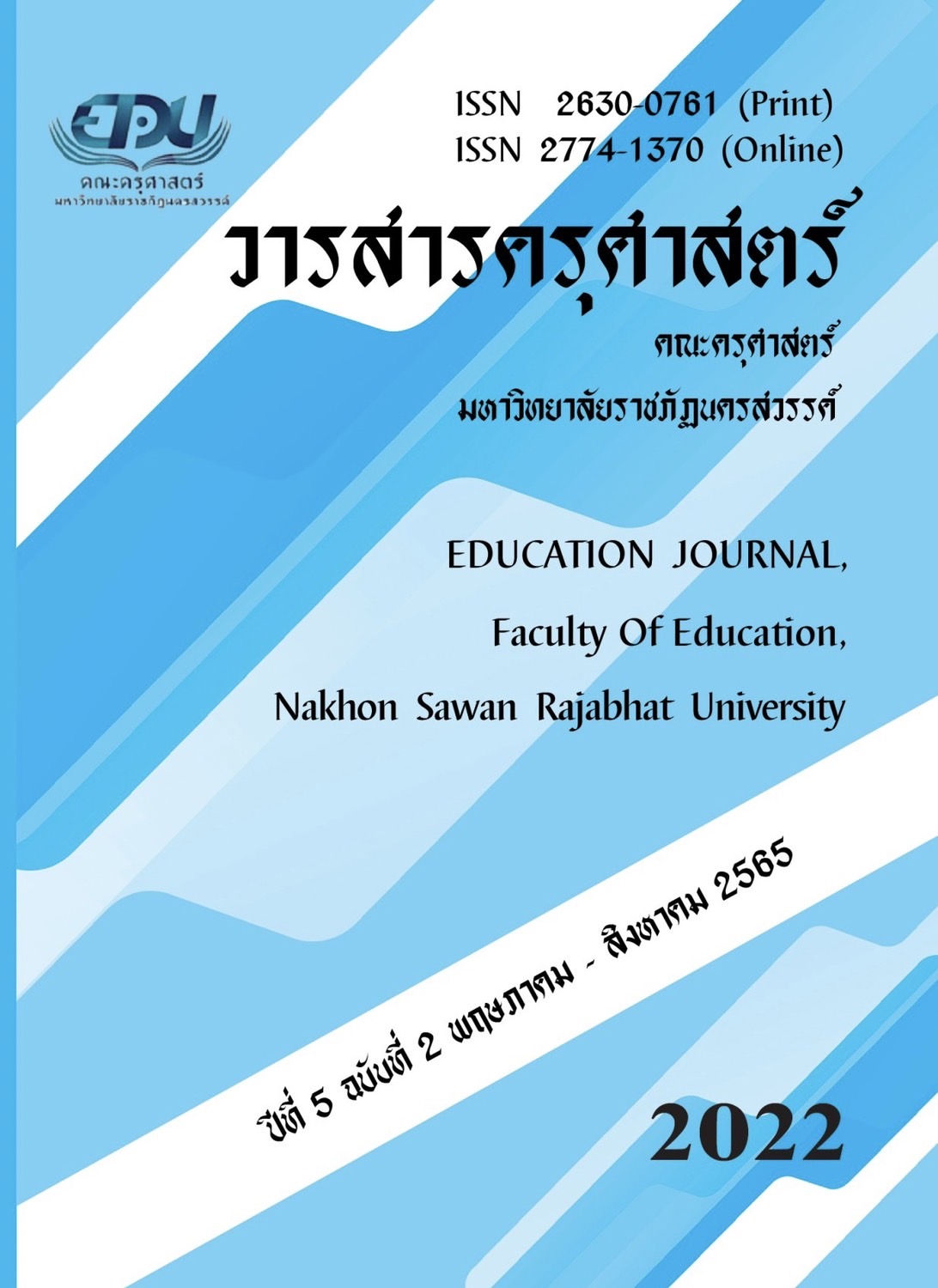Organizing Activities to Enhance the Pumpkin Project Experience to Promote Critical Thinking Skills for Early Childhood
Main Article Content
Abstract
The objectives of this research were 1) to study the results of the pumpkin project experience enhancement activities; and 2) to compare the analytical thinking skills before and after the pumpkin project experience enhancement activities. The target group used in the study was early childhood, kindergarten year 3, age 5 - 6 years, semester 2, academic year 2020, Ban Khao Cha-ngok School obtained by selecting a specific. The research instruments were 20 plans for the pumpkin project experience enhancement activities, 4 sets of manual for organizing the pumpkin project experience activities, 3 sets of analytical thinking skills test of preschool children with 0.72 confidence. This research is an experimental research with a one group pretest – posttest design. Data analysis using mean scores standard deviation and the difference test using percentage values. The research results were found as follows;
1) The overall analytical thinking skills for early childhood children before the pumpkin project experience activities was 61.50% (= 14.76) and after the pumpkin project experience activities were 95.43% ( =22.90). 2) The results of the comparison of the analytical thinking skills before and after the pumpkin project experience activities were found that the children developed the thinking skills after the activities were higher than before the activities.
Downloads
Article Details

This work is licensed under a Creative Commons Attribution-NonCommercial-NoDerivatives 4.0 International License.
References
กุลยา ตันติผลาชีวะ. (2551). การจัดกิจกรรมการเรียนรู้สำหรับเด็กปฐมวัย. กรุงเทพฯ: โรงพิมพ์มิตรสัมพันธ์กราฟฟิค.
นรินทร์ พูลเพิ่ม. (2562). ฟักทอง: ชุด เกษตรกรรมลองทำดู: ฟักทอง: ชุด เกษตรกรรมลองทำดู. กรุงเทพฯ: นานมีบุ๊ค.
นิภา เกษตรสมบูรณ์. (2558). ผลการจัดประสบการณ์แบบโครงการโดยใช้กระบวนการกลุ่มที่มีต่อทักษะพื้นฐานทางคณิตศาสตร์ของเด็กปฐมวัย. วิทยานิพนธ์ครุศาสตรมหาบัณฑิต (หลักสูตรและการสอน). มหาวิทยาลัยราชภัฏสงขลา.
นันฺธิชา ทาภักดี. (2558). การพัฒนาการจัดประสบการณ์เสริมทักษะทางวิทยาศาสตร์ สำหรับเด็กปฐมวัย. วิทยานิพนธ์ครุศาสตรมหาบัณฑิต (หลักสูตรและการเรียนการสอน). มหาวิทยาลัยราชภัฏมหาสารคาม.
น้ำผึ้ง เลาหบุตร. (2560). การพัฒนาความสามารถในการแก้ปัญหาอย่างสร้างสรรค์และทักษะทางสังคม โดยการจัดประสบการณ์เรียนรู้แบบโครงการสำหรับเด็กปฐมวัย. วิทยานิพนธ์ศึกษาศาสตรมหาบัณฑิต (หลักสูตรและการนิเทศ). มหาวิทยาลัยศิลปากร.
บุญชม ศรีสะอาด. (2556). วิธีการทางสถิติสำหรับการวิจัย เล่ม 1. (พิมพ์ครั้งที่ 5). กรุงเทพฯ: สุวีริยาสาส์น.
บุญศรี ใหม่คามิ. (2557). การเปรียบเทียบผลการจัดกิจกรรมประสบการณ์ตามแนวการสอนแบบโครงการกับแบบปกติที่ส่งผลต่อการพัฒนาการของนักเรียนชั้นอนุบาลปีที่ 3. วิทยานิพนธ์การศึกษามหาบัณฑิต (หลักสูตรและการสอน). มหาวิทยาลัยมหาสารคาม.
ปิยะนันท์ พูลโสภา. (2560). การพัฒนาการเล่น เพื่อการเรียนรู้ของเด็กปฐมวัยในศตวรรษที่ 21. วารสารศึกษาศาสตร์ปริทัศน์, 32(1), 1 – 8.
พัชรี ผลโยธิน. (2556). การเรียนรู้ของเด็กปฐมวัยไทยตามแนวคิดไฮสโคป. กรุงเทพฯ: อัมรินทร์พริ้นติ้งแอนด์พับลิชชิ่ง.
ยุพา ศิริรักษ์. (2558). ผลการจัดประสบการณ์การเรียนรู้แบบโครงการที่มีต่อความสามารถด้านการสังเกต การจำแนก และการเปรียบเทียบของเด็กปฐมวัย. วิทยานิพนธ์ครุศาสตรมหาบัณฑิต (หลักสูตรและการสอน). มหาวิทยาลัย ราชภัฏนครสวรรค์.
วัฒนา มัคคสมัน. (2554). การสอนแบบโครงการ. (พิมพ์ครั้งที่ 3). กรุงเทพฯ: วี.พริ้นท์.
สรวงพร กุศลส่ง. (2552). ทักษะกระบวนการทางวิทยาศาสตร์สำหรับเด็กปฐมวัย. เอกสารคำสอน ชุดวิชาวิทยาศาสตร์สำหรับเด็กปฐมวัย. เพชรบูรณ์: มหาวิทยาลัยราชภัฏเพชรบูรณ์.
สุทธิ์นา ขันอาสา. (2550). ความสามารมทางพหุปัญญาของเด็กปฐมวัยที่ได้รับการจัดประสบการณ์แบบโครงงาน. วิทยานิพนธ์การศึกษามหาบัณฑิต (การศึกษาปฐมวัย). มหาวิทยาลัยศรีนครินทรวิโรฒ.
อรอนงค์ เดชโยธิน. (2559). การพัฒนาการรู้สิ่งแวดล้อม ของนักเรียนชั้นมัธยมศึกษาปีที่ 3 โดยใช้การสอนแบบโครงการที่เน้นการคิดแก้ปัญหา. วิทยานิพนธ์ปริญญาดุษฎีบัณฑิต. มหาวิทยาลัยมหาสารคาม.
Hartman, A. J. (1995). Project work: Supporting children’s need for inquiry. Association For Children Education International, 7(3), 93.
Katz, H. C. (1993). The hundred languages of children: The Reggio Emilia approach to Early childhood education. Norwood, New York: Ablex.


